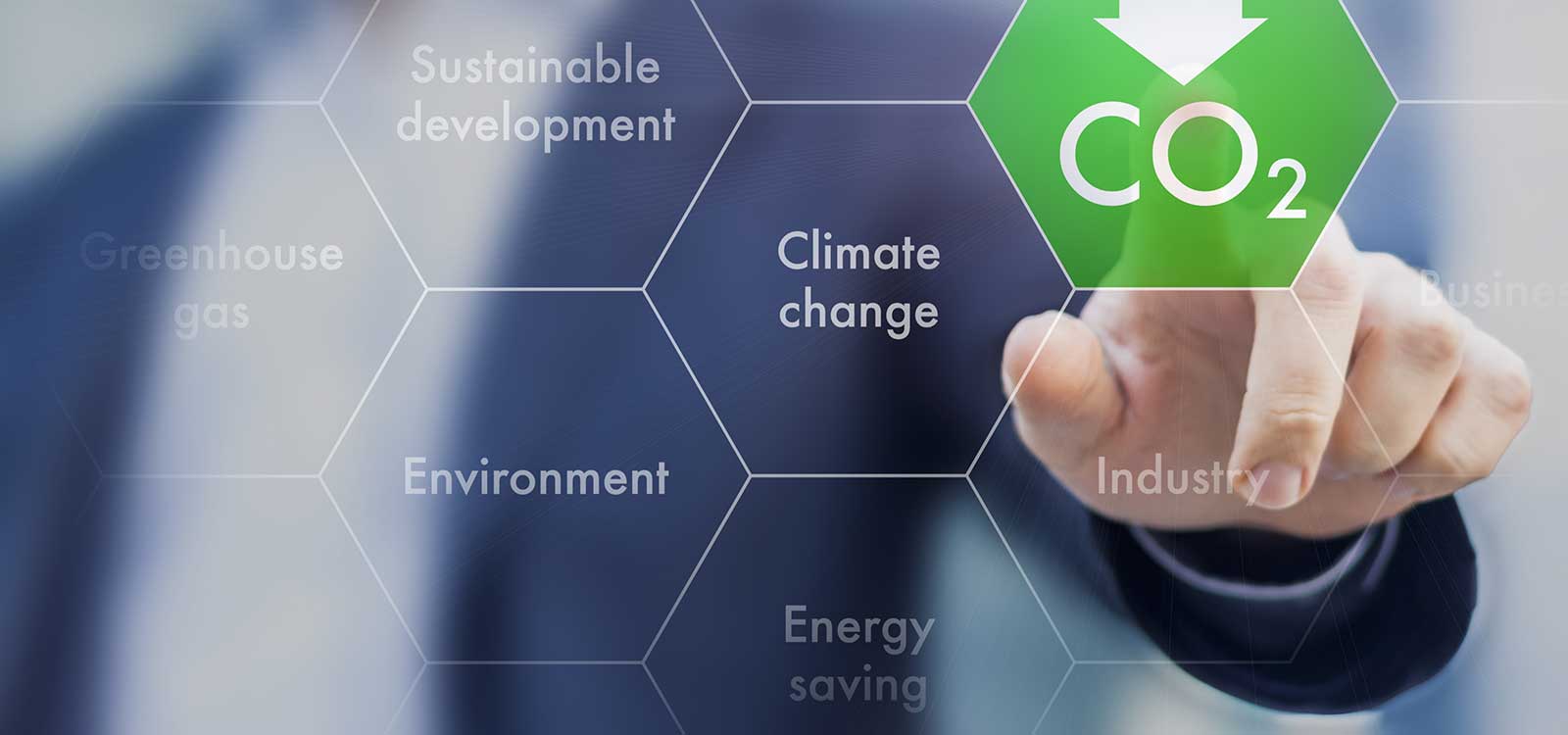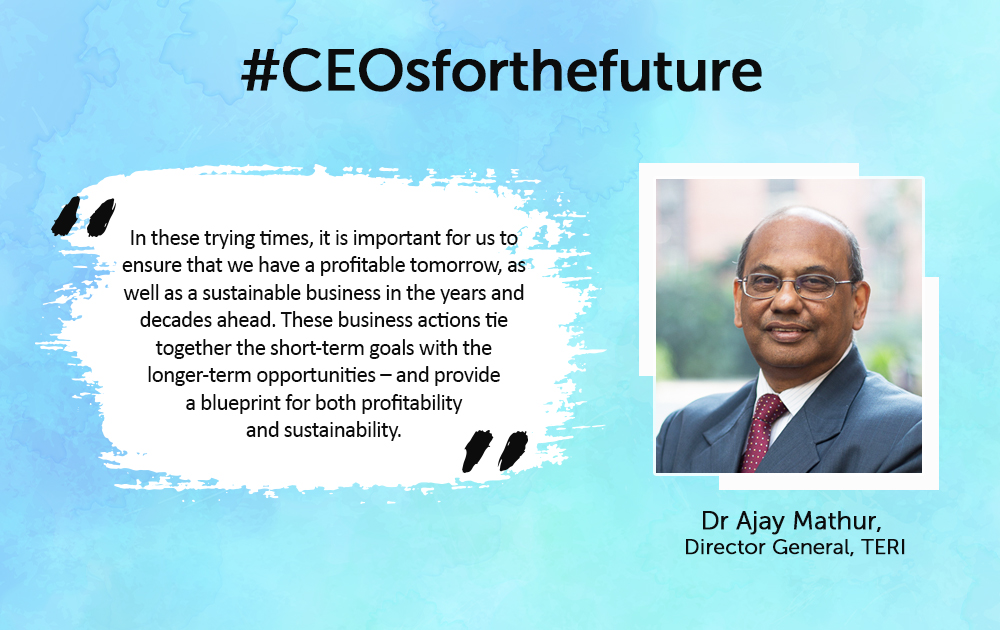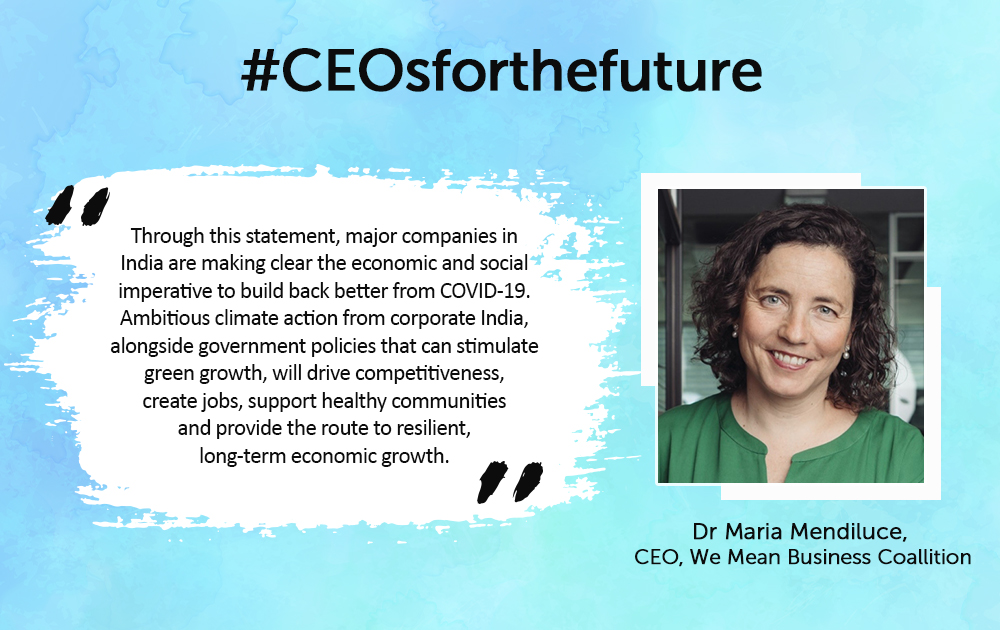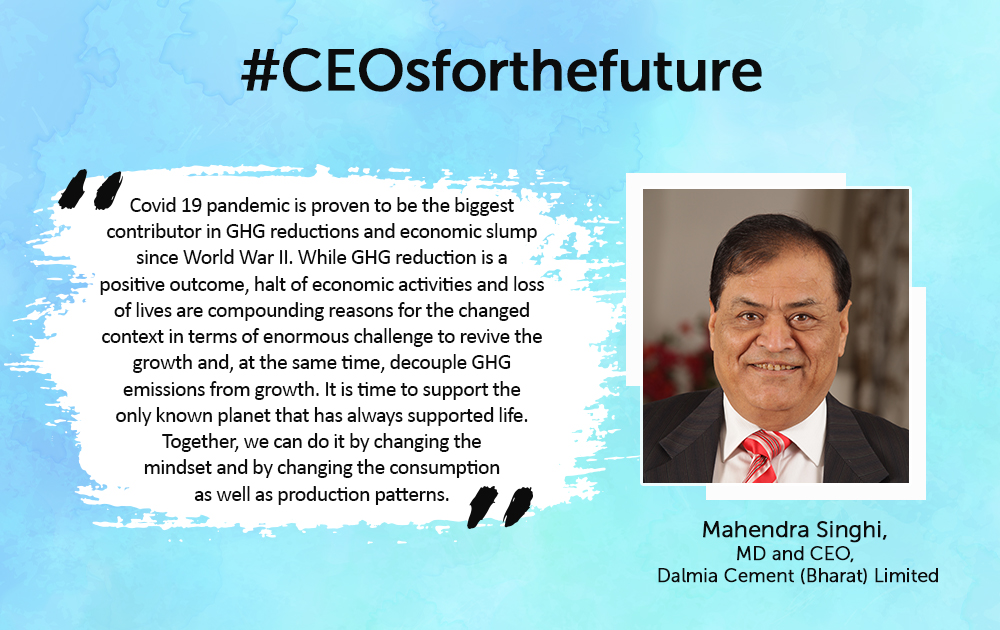Twenty business leaders from India have signed a statement that is a 'call to action' that outlines priorities for repurposing business activity to stimulate green growth and create more resilient India in the economic recovery required in the wake of the Covid 19 pandemic

The World is currently facing one of the most challenging periods in recent history – the dual impact of a public healthcare crisis, compounded by an impending economic crisis. As India mobilises its response to these events, it is imperative that we build back better, improving resilience and guaranteeing sustainability.
Whilst today, we are wrestling with the economic consequences of the coronavirus pandemic, this should not divert us from the goal of reducing carbon emissions to avoid the worst effects of climate change. Indeed, investing in a clean energy future, along with protecting and enhancing the environment, are the only ways to ensure that we achieve rapid, sustained growth in the long term with employment opportunities for all.
In order to achieve inclusive growth and emissions reductions in line with the Paris Agreement, collective effort is necessary, requiring active participation from corporate India. To promote policies that can stimulate green growth and create a resilient India, this Statement outlines a set of 8 priorities for repurposing business activity.
This statement is a 'call to action' for businesses to prioritise actions that can work alongside the government and civil society to deliver a step-change in sustainable growth.
1. Invest in social infrastructure, ensuring greater access and resilience
Why it matters: There is a clear need to improve public healthcare and welfare support for vulnerable communities across India. This will guarantee greater resilience to future shocks, including infectious diseases, economic impacts, and extreme weather events.
Call to action: This should include focusing resources on slum rehabilitation through extending and improving existing coverage of services, such as energy, water, and transport. It will be vital to support employment creation in these areas, such as local construction, to help maintain incomes.
2. Accelerate the power sector transition and clean mobility adoption
Why it matters: India is already a champion of renewable energy technology development and deployment, which has resulted in significant benefits for the country. To support the sector, create jobs, lower energy costs and reduce emissions, all measures should be taken to further accelerate this transition. The Indian auto sector has seen sharply declining sales, with the trend starting prior to COVID-19. New direction is required to capture emerging markets and drive down pollution.
Call to action: Rapid policy reform to facilitate system flexibility, reducing regulatory barriers, and improving the financial situation of DISCOMs through re-establishing electricity demand via electrification of transport and industry using renewables. There also needs to be clear direction in transition towards clean mobility solutions in a technologically agnostic manner. This, in line with new infrastructure to support the technology, can provide domestic auto makers with confidence for the future and avoid lock-in to outdated technology.
3. Deploy solutions for growing & managing food to support expanding requirements
Why it matters: With a population projected to reach 1.5 billion by 2030, and climate risks threatening food security, livelihoods, water supply and human health, India needs to urgently shift to sustainable food production and consumption. A sound system of growing and managing food will support the nation's nutritional requirements, feeding the entire population, and improving the health of agricultural lands simultaneously.
Call to action: This will include modernising food supply chains using cold storage from the field to the consumer, to reduce wastage and improve competitiveness. This also includes intelligent crop allocation, taking into account local climate, soil quality and water use. We also need to plan for the long-term with research on future food and land use systems.
4. Collaborate and invest to achieve Land Degradation Neutrality
Why it matters: Land degradation is one of the most significant contemporary environmental issues facing India today, with around 82.4 mha currently undergoing degradation. The loss of ecosystem services that occurs impacts food security, exacerbates migration and poverty, and reduces global competitiveness. The annual economic costs of land degradation are estimated at 2.5% of the GDP.
Call to action: Actors will need to pool resources to promote investment to arrest land degradation, including through CSR commitments, to help India achieve Land Degradation Neutrality. Ensure policy can provide adequate protection of our most valuable ecosystems, which provide habitat resilience, as well as carbon sequestration.
5. Pioneer green manufacturing and industrialisation
Why it matters: Lay the groundwork for heavy industries to become clean technology pioneers in areas such as electrification and alternative fuels, providing goods and materials without the negative environmental impacts, to support India's rapid growth. This will also include accelerating activity on resource efficiency and material circularity to minimise energy consumption and raw material extraction.
Call to action: This will require collaboration with international partners to deploy advanced technologies in the steel, cement, aluminium, chemicals, and petrochemicals sectors. Industries will also need to work with their customers to understand the demands for green materials, supported by standards and regulations to make these the default options for new projects. Ensure that all facilities and operations are 'zero-waste to landfill', reusing or recycling materials that would otherwise be wasted.
6. Transform the green building revolution as the new normal across geographies & demographics
Why it matters: The construction sector has been particularly hard hit during the pandemic and subsequent lockdown. As activity restarts, we need to ensure that new buildings and infrastructure are built to much higher standards and existing structures are sufficiently retrofitted, to withstand extreme events, reduce energy consumption and last far longer.
Call to action: This includes the introduction of stronger building byelaws that integrate green principles into building design and operations, under such standards as GRIHA IGBC, LEED etc. India's role as co-lead of the Coalition for Disaster Resilient Infrastructure (CDRI) will be vital in showcasing best practice for the world to follow.
7. Invest in research for new clean energy sources to strengthen India's energy outlook
Why it matters: India will need to seek out new growth opportunities as the global economy recovers. Given competitive labour costs, large domestic market, and a technically proficient workforce, India is well-suited to expand activity across a range of clean energy technologies.
Call to action: Clear, consistent policies are needed, which can act as a lightning rod for green finance for new technologies, mobilising both international and domestic resources. Green hydrogen is one such area, where support from research to commercialisation is required to make this low carbon energy carrier competitive across industry, transport, and power.
8. Provide access to green finance to support emission saving measures across sectors
Why it matters: As part of the existing recovery measures, the government has provided significant equity for the MSME and agricultural sectors to purchase new equipment to become more productive. New low carbon technologies and infrastructure is often capital-intensive, requiring significant upfront investments.
Call to action: Financial institutions and investors will need to step up to provide green equity to accelerate sustainable growth across all sectors of the economy. This includes MSMEs and agriculture but should also be extended to the transport, larger industry, and power sectors.



To download the report Click here
Signatories
| 1 | Amplus Energy | Mr Sanjeev Aggarwal | CEO |
| 2 | Avaada Group of Companies | Mr Vineet Mittal | Managing Director |
| 3 | BPCL | Mr D Rajkumar | CMD |
| 4 | CLP India | Mr Rajiv Ranjan Mishra | Managing Director-India |
| 5 | Dalmia Cement (Bharat) Ltd | Mr Mahendra Singhi | MD & CEO, Dalmia Cement (Bharat) Ltd and Co-Chair, TERI CBS Executive Committee |
| 6 | Danfoss Industries Pvt. Ltd | Mr Ravichandran Purushothaman | India Head |
| 7 | Delhi International Airport – GMR Group | Mr Videh Kumar Jaipuriar | CEO |
| 8 | DS Group of Companies | Mr Anshu Dewan | President |
| 9 | Ecofirst Services Ltd | Mr Chitranjan Kaushik | Chief Operating Officer |
| 10 | Flipkart Group | Mr Kalyan Krishnamurthy | Chief Executive Officer |
| 11 | Fourth Partner Energy Ltd | Mr Saif Dhorajiwala | Founder Director |
| 12 | Godrej Industris Ltd | Mr Nadir Godrej | Managing Director |
| 13 | India Power Corporation Ltd | Mr Raghav Raj Kanoria | Managing Director |
| 14 | Jain Irrigation Systems Ltd | Mr Anil B. Jain | Managing Director |
| 15 | Magarpatta Township Development & Construction Company Ltd | Mr Satish Magar | Chairman and Managing Director |
| 16 | Mindspace Business Parks REIT | Mr Vinod Rohira | Chief Executive Officer |
| 17 | PTC India | Mr Deepak Amitabh | Chairman and Managing Director |
| 18 | RenewPower | Mr Sumant Sinha | Chairman and Managing Director |
| 19 | Schneider Electric India | Mr Anil Chaudhry | Country President & Managing Director |
| 20 | Tata Chemicals Ltd | Mr R Mukundan | Managing Director, Tata Chemicals Ltd and Co-Chair, TERI CBS Executive Committee |
| 21 | Tata Cleantech Capital | Mr Manish Chourasia | Managing Director & CEO |
| 22 | Tata Power | Mr Praveer Sinha | CEO & Managing Director |
| 23 | Tata Steel Ltd | Mr T V Narendran | CEO & Managing Director |
| 24 | Yara Fertilisers India Pvt. Ltd | Mr Sanjiv Kanwar | Country Manager - Business Unit Asia |
The development of this Business Statement was supported by The Energy and Resources Institute (TERI) in partnership with the We Mean Business Coalition and its partners - The Climate Group (TCG), the World Business Council for Sustainable Development (WBCSD), the Carbon Disclosure Project (CDP) and the World Resources Institute India (WRI India). Through a collaborative effort, these organisations have worked together to ensure a broad range of business voices have been included among the corporate signatories. Through this work, it has been possible to amplify progressive voices within the business community, who will help drive forward a green recovery.
Partners





